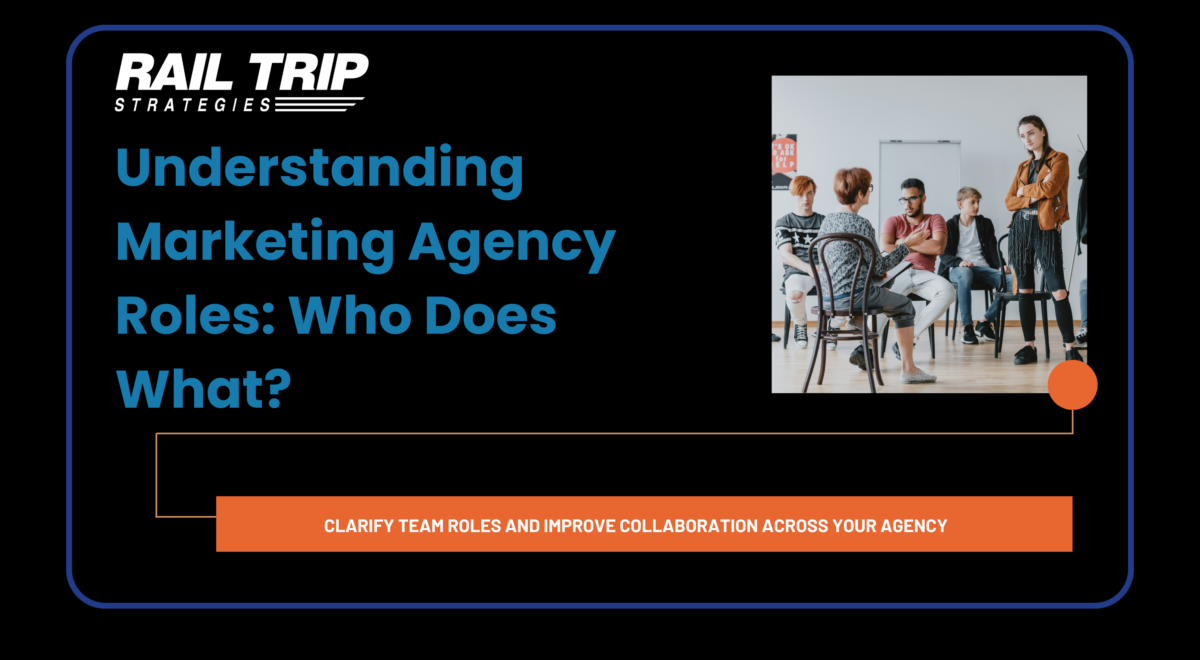Marketing agencies bring together specialized teams to create campaigns that resonate with your target audience. From crafting content to implementing data-driven strategies, agencies help businesses navigate the complexities of marketing to achieve growth. Understanding these roles is key to maximizing your marketing efforts. Each position contributes to the overall success of the agency, delivering results through a well-coordinated process.
Curious about the different roles in a marketing agency and which might suit your business? You’re in the right place.
What Is a Marketing Agency?
A marketing agency is an external partner specializing in developing and executing strategies tailored to your business. These agencies offer a range of services, from branding and advertising to digital marketing, social media management, and content creation. Their teams of experts work together to provide marketing solutions that align with your goals, acting as an extension of your in-house team.
With deep industry knowledge, agencies deliver the latest trends, best practices, and specialized tools to enhance your marketing efforts without the need to build and maintain an in-house team.
How Marketing Agencies Work
Marketing agencies bring together diverse talent to craft and execute campaigns. The process begins with an initial consultation to understand the client’s goals, followed by collaboration across departments such as strategy, creative, media, and analytics.
Account Managers are the main contact point, ensuring communication between the client and internal teams.
Creative Teams translate strategy into compelling content—whether visual or written—that resonates with the target audience.
Media Teams plan and distribute content across digital and traditional platforms.
Analytics Teams track campaign performance and provide insights for improvement.
With collaboration at its core, agencies combine expertise to create and execute impactful marketing campaigns.
Core Departments in a Marketing Agency
A high-performing marketing agency is a collaborative ecosystem of specialized departments, each critical in delivering results. Understanding how these departments function helps clients set clearer expectations and showcases the level of expertise that goes into a successful campaign.
Account Management: Acting as the main point of contact, account managers ensure seamless communication between clients and internal teams. They’re responsible for understanding client goals, relaying feedback, and keeping projects on track.
Strategy: This team sets the direction for campaigns based on data, market research, and client objectives. Strategists determine target audiences, channel mix, positioning, and KPIs to guide creative and media efforts.
Creative Department: Comprising copywriters, graphic designers, video editors, and art directors, the creative team brings ideas to life visually and verbally. Their role is to craft compelling messages that resonate with the intended audience and reflect the brand’s identity.
Media & Advertising: These specialists plan, buy, and manage paid media campaigns across channels like Google Ads, social media, and programmatic platforms. They focus on delivering the right message to the right audience at the right time.
Technology & Analytics: This department handles data tracking, performance reporting, attribution modeling, and the tech infrastructure behind campaigns. Their insights are used to refine strategy and prove ROI.
Operations & Project Management: Responsible for timelines, budgets, and workflow, this team ensures that every campaign runs efficiently. They coordinate between departments and manage deliverables to keep projects moving smoothly.
Technology & Analytics: Using tools to track performance and optimize campaigns.
Each department is essential, but the magic happens when they collaborate, integrating creative ideas, technical execution, and strategic thinking to deliver real business results.
Top 5 Emerging Roles in Modern Marketing Agencies
As the marketing landscape evolves, agencies introduce new roles to keep up with technology, data, and changing consumer behavior. These emerging positions go beyond traditional creative and account roles, offering specialized skills that drive innovation and measurable results.
- Marketing Technologist – Acts as the bridge between marketing and IT, helping integrate platforms like CRMs, automation tools, and analytics systems to streamline operations.
- Conversion Rate Optimization (CRO) Specialist – Focuses on improving the performance of landing pages and websites to turn more visitors into leads or customers.
- Content Strategist – Goes beyond copywriting to plan, organize, and optimize content across channels, aligning with SEO, audience intent, and brand voice.
- Influencer Marketing Manager – Manages outreach and partnerships with influencers, ensuring campaigns are authentic, targeted, and ROI-positive.
- AI & Automation Specialist – Uses AI tools like ChatGPT, Jasper, and marketing automation software to scale personalization, improve productivity, and reduce repetitive tasks.
These roles reflect the increasing need for data literacy, automation fluency, and audience-first thinking in modern marketing. Agencies that embrace these positions are better equipped to adapt, innovate, and stay ahead of client expectations.
The Role of Creativity and Strategy
Creativity and strategy are the foundation of successful marketing. Creative teams turn ideas into engaging content, while strategists ensure that campaigns are aligned with data-driven goals. The seamless integration of both is what transforms marketing efforts into measurable results.
For instance, a strategist might identify the right audience for a product launch, and the creative team will craft messaging that resonates with that group. This collaboration ensures that campaigns are not only visually appealing but also effective in reaching business objectives.
Ready to Grow? Let’s Make It Happen.
At Rail Trip Strategies, we know that successful outreach goes beyond great campaigns – it’s about optimizing your sales process to drive real results. Whether you need expert guidance or streamlined sales efforts, we’re here to help you connect with your ideal prospects and elevate your marketing strategy.
Let’s explore how a tailored outreach plan can boost your brand and grow your business.

